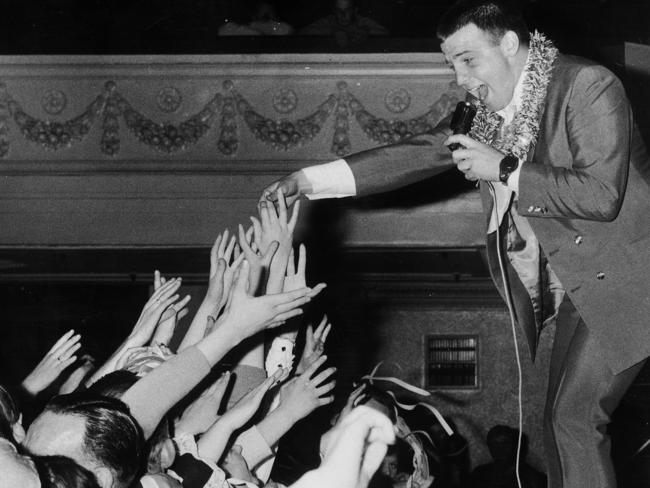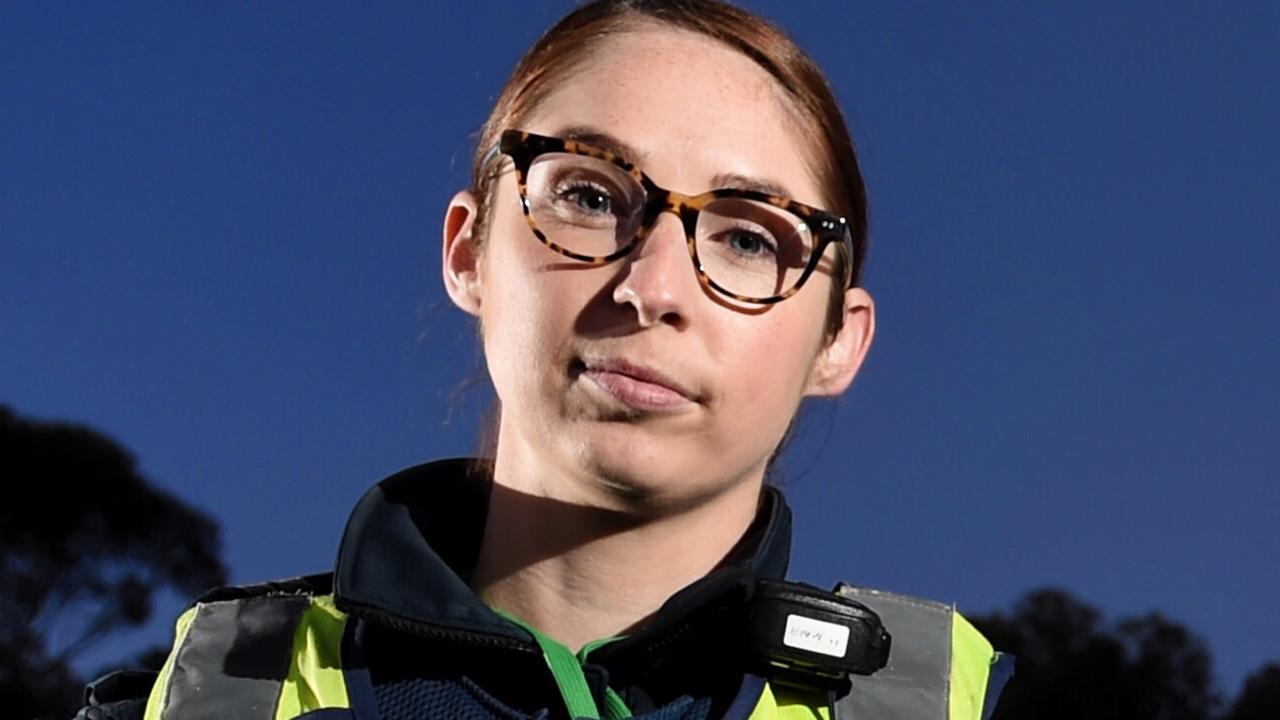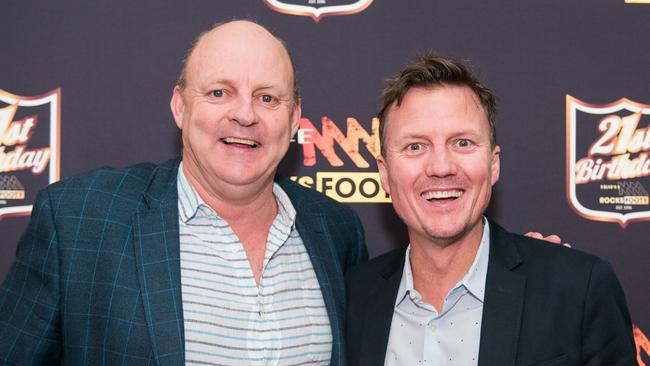Aussie music great Normie Rowe has seen many changes but music remains the same
FIFTY years ago, a fresh-faced teenage singer recorded an unlikely hit single. The rest, as they say in the biz, is history for Normie Rowe.

VIC News
Don't miss out on the headlines from VIC News. Followed categories will be added to My News.
IT is surely the most unlikely pop hit Australia has ever witnessed.
An 18-year-old singer and his band go in to a small Melbourne recording studio in June 1965 to put down a song co-written decades earlier by a long-dead American poet born in 1885.
The song is from a stage show the singer has never seen, its words in the black ghetto patois of a drug dealing pimp cynically questioning whether the Bible is telling the truth.
It Ain’t Necessarily So has been recorded by some of music’s biggest names — Aretha Franklin, Bobby Darin, Nat King Cole, Bing Crosby, Cher, Sting, the Moody Blues, Cab Calloway, Louis Armstrong — but it has only ever been a hit sung by one man: Normie Rowe.
His surprisingly sophisticated and multi-layered interpretation of the showstopper from the Gershwins’ opera Porgy and Bess took the song to No. 5 — Rowe’s first hit — and it kickstarted a frantic three years of fame, performing and recording that ended only with his controversial call-up to Vietnam.
It Ain’t Necessarily So was an eccentric start to a career, indeed a life, that over 50 years of performing has involved stints in music theatre (including an acclaimed turn as Jean Valjean in the 1987 Cameron Macintosh production of Les Miserables), on television and touring as a singer — but that which never stuck with the script.

Next month Rowe is marking the 50th anniversary of the song that started it all with a concert at the Memo Music Hall in St Kilda, the very room where, with the help of producer the late Pat Aulton and legendary sound engineer Bill Armstrong, they taped the song in a studio then known as Telefil.
(Pat Aulton went in to the advertising jingle business and had great success with campaigns for Coca-Cola, Weet-Bix and Singapore Airlines. He produced and arranged the ALP’s famous It’s Time campaign song.)
Rowe had been introduced to It Ain’t Necessarily So by Stan Rofe, Melbourne’s first and Australia’s most influential radio disc jockey.
Rofe remembered a song he had heard on the obscure album This Is Merseybeat Volume 2: a hurriedly assembled collection of non-hits from the third division of Liverpool bands gigging away mostly anonymously in the wake of the Beatles’ overwhelming triumphs.
On it was a version of It Ain’t Necessarily So by Ian and the Zodiacs that Rofe believed suited Rowe’s voice even if the song itself seemed an unlikely choice.
Days before the recording session, however, Rowe and his band tested the song on the usually haughtily indifferent dancers at the Preston Circle Ballroom, back then always a tough room.
The song brought the audience to a stop and Rowe understood he had something special on his hands.
But a hit? That depended on who might play it and radio could be fickle, but with Rofe on side it was shortly climbing the charts.
Rowe had his first hit. And then another. And another.
He was soon a pop sensation with all that entailed in 1965, including magazine covers, television appearances and — wherever he went in Australia — screaming girls, so uncontrollable that it often took police to restore order.

These moments have been collected together for a CD called Frenzy — The 50th Anniversary Collection to be released on June 5 and that includes Rowe’s hits when he was the country’s highest profile entertainer scoring 11 top ten singles, 13 EPs and five albums.
But when his first single came out and he was given a copy, he couldn’t play it. Rowe’s mum and dad didn’t own a record player.
“We had to take it in next door where there was a radiogram of some sort — it was a fantastic thing (to hear it), but then to hear it on the radio, it was one of the biggest thrills of a lifetime,” Rowe recalls.
By then it was not uncommon for Rowe to be doing five gigs a night.
The recording schedule was equally demanding: Rowe completed two albums in the remaining months of 1965, and three the following year.
But he says he was naive and trusting and only discovered a few years later that he had never made a cent from them.
Having been named Australia’s first King of Pop, and with a string of hits including Pride and Joy, Que Sera Sera, I (Who Have Nothing) and its “b” side Shakin’ All Over, Rowe set off for London, then the epicentre of popular music but a city which had often proved a death trap for Australian acts.
Over the next couple of years Rowe would tour with, and learn from, some of the greats: Roy Orbison, The Troggs, Kiki Dee, Gene Pitney, Julie Driscoll and Brian Auger, the Spencer Davies Group and Sounds Incorporated.

But a night at a club called The Tiles changed Rowe’s view of the power of music. Blues singer Chris Farlowe opened the show with a dramatic reworking of the Rolling Stones song Out of Time.
The main act was Otis Redding who was regularly touring London then, but this night he also played homage to the Stones, indeed British music.
He launched in to a fiery interpretation of (I Can’t Get No) Satisfaction.
This was significant, and Rowe knew it.
That an American soul-blues legend would pay tribute to a white blues “export” to America was an endorsement of London’s place in the music world.
Backstage that night Rowe found himself alone with Tom Jones and Redding.
He appeared set for international stardom himself, particularly when he chanced upon an overlooked song written by the highly respected husband and wife team of Barry Mann and Cynthia Weil: It’s Not Easy might have turned in to a classic for whoever recorded it, but Rowe’s sessions for the song created its definitive version.
It was to have been the follow-up hit to the Righteous Brothers’ international bestseller You’ve Lost That Loving Feeling, but fearing that they would have to work once more with the unstable and threatening producer Phil Spector, the Righteous Brothers passed on it.
Rowe recorded the song at London’s Advision Studios with the three best known, most gifted and hard-to-book musicians in London.
Jimmy Page was on lead guitar and John Paul Jones on bass (they would soon form Led Zeppelin).
And there was drummer Clem Cattini who had played on hits by the Kinks, Dusty Springfield, and Marianne Faithfull, as well as on the original Shakin’ All Over by Johnny Kidd and the Pirates that Rowe had recorded the year before.

It’s Not Easy became a huge hit in Australia, but when Rowe returned home he was called up for National Service.
The two years in uniform ended his pop dreams.
The Herald Sun revealed in 2008 that Australia’s most famous Vietnam conscript was deliberately and falsely drafted into the army and should never have been sent to war.
His birth date — February 1, 1947 — was not raised in the controversial ballots of dates that selected which 20-year-old men would be called to serve in Vietnam; 504 of whom were killed there.
“I had had plenty of success as a teenager, but it was still a job,” Rowe said of his call-up, once he discovered the truth.
“There were many other young Australians who were apprentices and tradesmen who’d done the same. I wasn’t going to duck out of national service if my number came up.”
Birthdays were big celebrations in Vietnam; there were usually more than a few people born on the same date.
Rowe always celebrated alone. He never met anyone with his birthdate.
Rowe was on record as supporting Australia’s role in Vietnam and this had not gone unnoticed by Lt-Col Beverly Smith who was in charge of army public relations in Melbourne.
In 1978 and on his deathbed, Smith admitted to his son — also a Vietnam vet, indeed Beverly Smith’s son once met Rowe in Vietnam — that it had been his idea to draft Rowe in the hope of replicating the PR coup when Elvis Presley joined the US Army at the height of his fame.
“Dad asked me if I ever saw Normie to apologise,” Victoria Police sergeant Grant Coultman-Smith said in 2008.
“He told me: ‘We fixed the dates. We got him in’.”
Rowe served in Vietnam with distinction and today is philosophical about the circumstances of his enlistment, but so much more has happened in his life — including the death of his then eight-year-old son, killed by a car when riding home with a mate from the school fete in 1979 — that he keeps it in perspective.
Normie Rowe’s scuffle with Ron Casey on The Midday Show in 1991 is of the most misunderstood episodes on Australian television.
Rowe had been asked on as part of a debate on a republic, the producers believing he would be a staunch monarchist.
Rowe wasn’t, and he was in any case suffering the effects of post traumatic stress syndrome, not that he was completely aware of that.
Channel Nine sought a replacement, but ran out of time. Rowe agreed to appear to voice his thoughts anyway, and was sat with pro-monarchists Di “Bubbles” Fisher and then Victorian RSL president Bruce Ruxton.
Combative Sydney radio host Ron Casey attacked Rowe’s views, and fellow veterans.

Referring to a badge Rowe had on his lapel, Casey snarled: “Oh we (Casey’s republican panellists) didn’t bleed in Vietnam — I’m so sorry mate. You live with a badge and that’s all you’ve got.”
But it wasn’t an RSL badge as Casey had assumed. It was a 3rd Cavalry Regiment (Vietnam) Association badge — Rowe had just found out he was to be its inaugural president.
Rowe walked towards Casey to show him the badge. Casey confronted Rowe who pushed him away.
Casey responded with a punch.
Producers held the men apart preventing Rowe from responding, as he clearly intended.
Rowe had planned to show Casey his badge and walk off the set.
Not long before Ruxton died in 2011, Rowe asked the ageing veteran why he hadn’t stepped in for him.
“You seemed to be doing all right by yourself, boy,” Ruxton replied with a mischievous smile.

Rowe returned two weeks ago from a trip to London during which he walked down Bond Street but couldn’t locate the Advision Studios, the scene all those years ago of that extraordinary session that produced It’s Not Easy.
Nor, strolling down Oxford Street, did he find The Tiles club.
The world has changed. And Normie Rowe has changed, too.
But very much alive in his memories — and ours — are those innocent, mad days when he was the hottest name in pop music at the other end of the earth.
Normie Rowe plays the Memo Music Hall on Saturday, June 6, at 8pm
memomusichall.com.au


